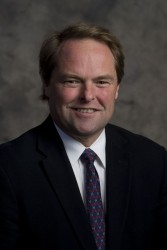 Neil Hamilton |
Agricultural law expert and professor Neil Hamilton shared his expertise in a recent story about urban sprawl on NPR’s “All Things Considered.”
The story, headlined “A Donkey’s Tale: When Urban Sprawl Encroaches,” tells of clashes that develop over animals wherever city meets country. It focuses on Sweet Water Red Gambler, a donkey living in Golden Valley, a residential area zoned for agricultural use near Reno, Nev.
The donkey’s loud and frequent braying disturbed the neighbors and
their complaints landed his owners — Nancy and Lee Bonham — in court
for violating a noise ordinance. They were found guilty and ended up
selling the donkey. Read the full story online and listen to the donkey bray.
Nearby livestock owners reacted by getting Washoe County to adopt a
policy to preserve the rural character of the area in the face of
development. This policy requires that anyone buying a new home in a
new subdivision must be informed of the existence of noise and odor
from livestock in the community.
Hamilton: New policy may not prevent nuisance suits
It’s not clear how effective the policy will be, but it bears watching, according to Hamilton, director of the Drake Agricultural Law Center.
“It’s certainly interesting,” Hamilton told NPR. “It’s a good example
of a homegrown democracy-type idea: ‘Well, we ought to protect
ourselves.’ But this type of ordinance wouldn’t necessarily prevent a
nuisance suit.”
He explained that the essence of nuisance law is “reasonableness,” and
what’s reasonable can change as the land changes. In other words, even
with the new policy in place, Golden Valley’s livestock owners may have
a hard time convincing a judge that animal noises are reasonable as the
community becomes more suburban.
More news media to feature Hamilton
Hamilton also was interviewed this week for a radio show on WOR 710 in
New York City that’s scheduled to be broadcast on Saturday, March 1.
The interview concerns the new “Doomsday Seed Vault” in Svalbard,
Norway, which has been making national news in the United States.
Hamilton is vice chair of the Seed Savers Exchange in Decorah, Iowa,
which has contributed 500 packets of heirloom vegetable seeds in the
first U.S. donation to the Svalbard collection.
He also was interviewed about the Seed Savers’ contribution by Jerry
Perkins of the Des Moines Register for a story scheduled to run in the
business section on Sunday, March 2.
In addition, Hamilton did an interview Thursday on WHO Radio’s “Big Show” with Ken Root in which he discussed:
- Drake Law School’s involvement with the Buy Fresh Buy Local initiative
- Matters related to the 2008 farm bill
- The new seed storage vault in Norway

